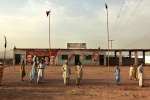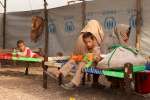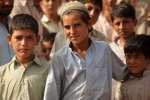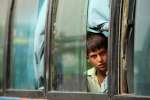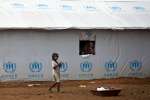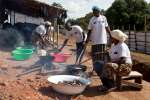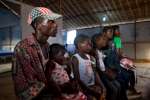First Mauritanian refugees return home after 20-year exile
News Stories, 29 January 2008

ROSSO, Senegal, January 29 (UNHCR) – The UN refugee agency on Tuesday launched a repatriation operation for up to 24,000 Mauritanian refugees in Senegal. A ferry carrying the first 102 returnees left the northern Senegalese town of Rosso during a morning ceremony attended by local officials and UNHCR representatives.
The boat crossed the Senegal River and docked at Rosso in Mauritania where they were welcomed by a high-level delegation, including Minister of Interior Yall Zakaria, other senior government officials and UNHCR Representative Didier Laye.
Most of the refugees, who have been living in exile in Senegal since fleeing Mauritania in 1989, had earlier in the day been brought by truck from two refugee sites located in Thiabakh and Dagana, after emotional send-offs.
"This long-awaited day has finally arrived," said Patrick Ntambwe, head of the UNHCR field office in the Senegalese town of Richard-Toll. He added that UNHCR and its local implementing partner OFADEC were delighted to be involved in helping the first group of Mauritanians to return home voluntarily.
After months of delays and frustration, the refugees were excited to finally be on the move. "I'm not scared of returning to Mauritania; to be honest, I'm proud to be going back," said Ibrahima Sow, who was only 12 when he arrived in Senegal, in 1989. Married with two children, he struggled to make ends meet in Senegal.
"This was a very intense moment," said Alphonse Munyaneza, a UNHCR staff member in Mauritania. "A large crowd of people was waiting. They handed flowers to returnees, waving banners to welcome them home." Malouma, one of Mauritania's most famous singers, sang a song written to celebrate the landmark moment.
On arrival in Mauritania, the returnees were taken to a registration centre where UNHCR gave them basic material assistance, including kitchen sets, blankets, buckets, mosquito nets, soap and sanitary kits. They also received a three-month food ration from the World Food Programme.
The returnees were later transported to their places of origin in and around Rosso. For some, their homecoming was tinged with sadness. "I decided to return to Mauritania with my [four] children because I am now a widow," said Bodjel Sow, "but also because I still hope to recover the assets that me and my husband lost in this drama – our house, our cattle."
Reintegration is usually a long and challenging process. In the case of Mauritanian refugees, it will also hopefully include the recovery of their properties. Meanwhile, quick impact projects will be implemented to spur income generation.
According to UNHCR, up to 24,000 Mauritanian refugees located in some 250 locations in Senegal could benefit from this repatriation programme. They will have been watching Tuesday's launch with great interest "The departure of the first convoy of Mauritanian refugees will be followed, we hope by many others," said UNHCR's Ntambwe.
This launch follows a series of positive steps to solve one of the most protracted refugee situations in Africa. After Mauritanian President Sidi Ould Cheikh Abdallahi announced last June 20 – World Refugee Day – his decision to invite all remaining refugees to return, a tripartite agreement was signed last November between the governments of Mauritania and Senegal and UNHCR, paving the way for the return of refugees.
In April 1989, a long-standing border dispute between Mauritania and Senegal escalated into ethnic violence. Some 60,000 Mauritanians fled to Senegal and Mali. UNHCR provided assistance to the Mauritanian refugees in northern Senegal until 1995 and facilitated the reintegration of 35,000 returnees who decided on their own accord to return to Mauritania between 1996 and 1998.
By Francis Kpatindé in Rosso, Senegal
and Alphonse Munyaneza in Rosso, Mauritania





